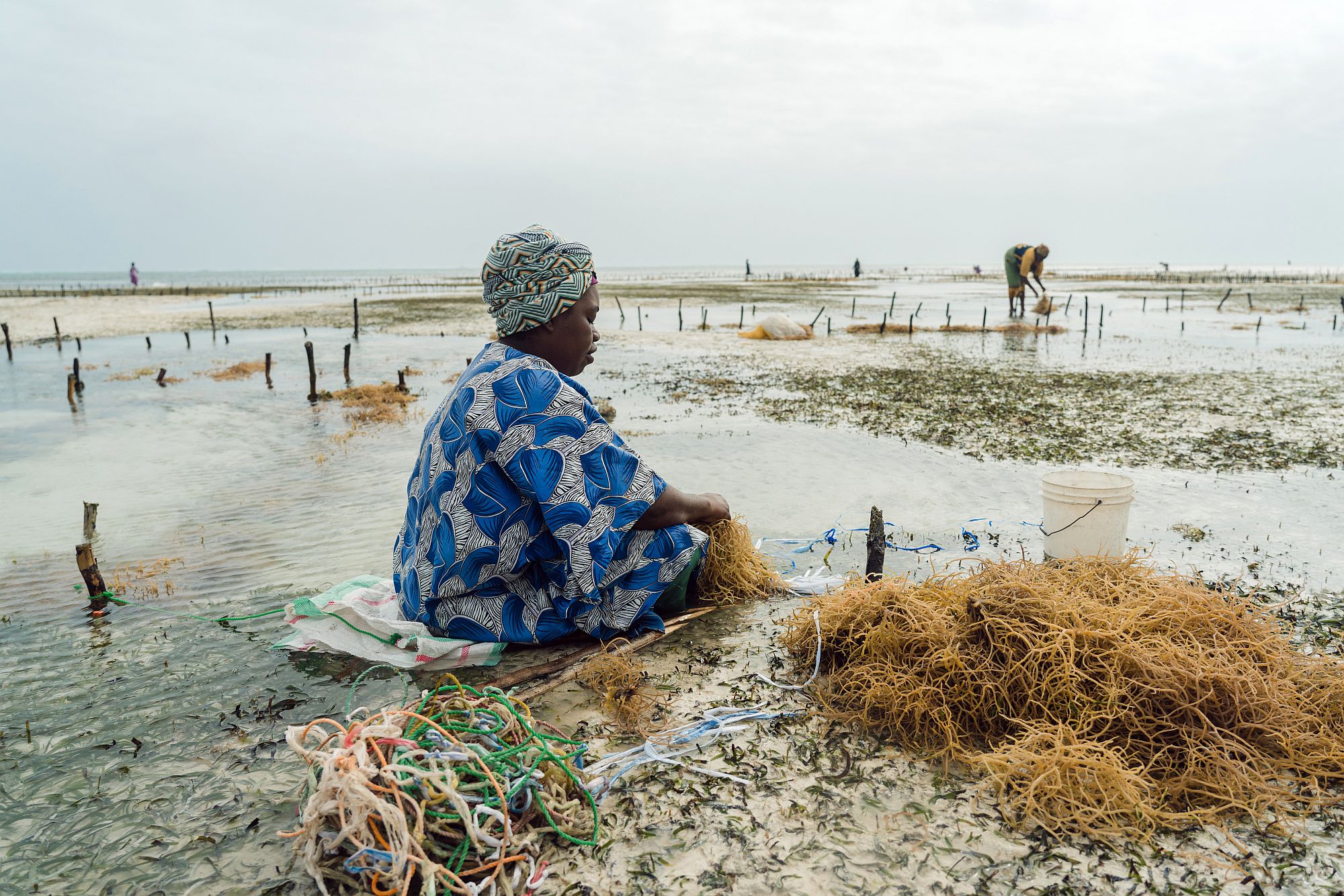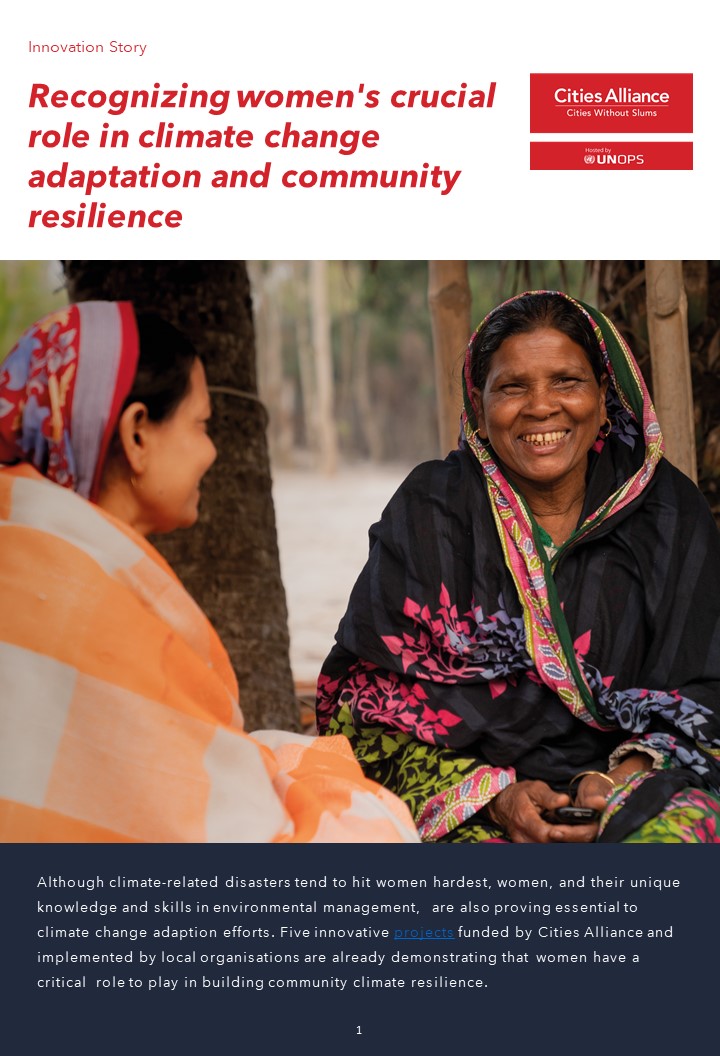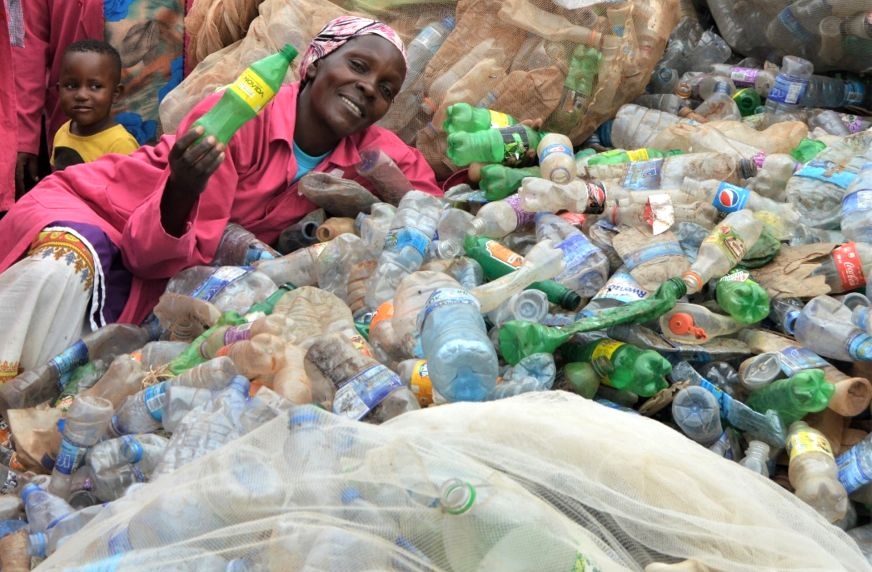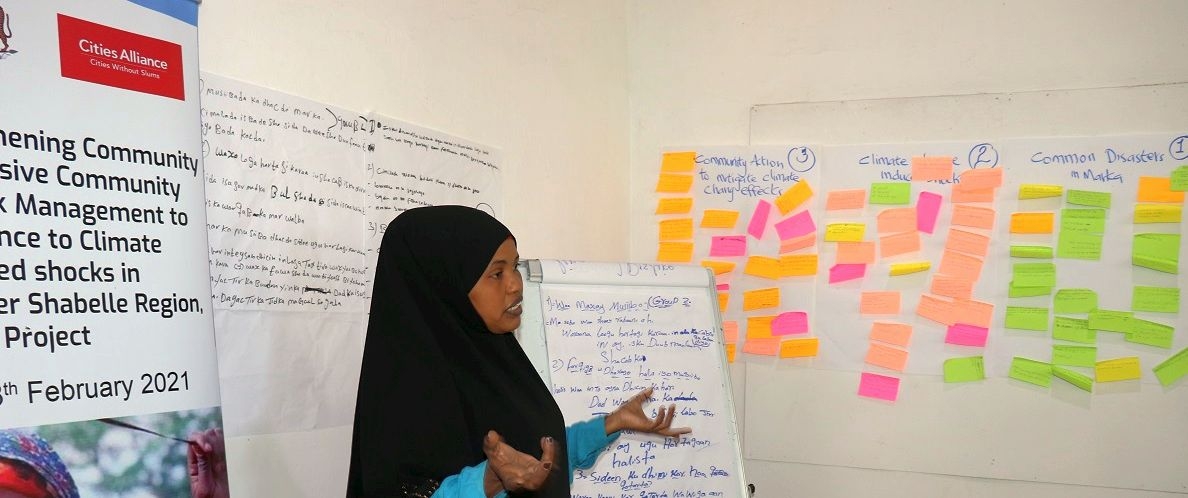- Who We Are
- How We Work
- Regional / Country Initiatives
- Legacy
- Core Themes
- Working Groups
- Portfolio & Results
- Newsroom
- Resources
Women's Crucial Role in Climate Adaptation and Resilience

Although climate-related disasters tend to hit women hardest, women and their unique knowledge and environmental management skills are also proving essential to climate change adaptation efforts. Five innovative projects funded by Cities Alliance and implemented by local organisations are already demonstrating that women are critical in building community climate resilience.

Heavy rains send floodwaters coursing through a crowded informal settlement. The muddy brown water carries eroded soils from hills and fields, plant debris, waste and garbage, along with pieces torn away from houses, bedding, chairs, clothing, bowls and cups, shoes and the occasional facemask.
Flooding in Bwaise, a large informal urban settlement in Kampala, Uganda, especially affects women.
In these slums, women are at home with the children, taking care of the domestic aspects of home life.
Angella Kansemiire, Tree Adoption Uganda (TAU).
After the floodwaters recede, it's usually the women of the community who pick up the pieces and put their families' lives back together again. They clean out the mess of mud and debris, salvage their families' belongings, wash and dry household goods, replant ruined gardens and carry on until the next time.
But in places where torrential rains bring flooding at a catastrophic scale, such as in Somalia and Bangladesh, it may not be possible for people to return to their homes for months or even years. Instead, women may be forced to care for their families as best they can in displacement camps, alongside thousands of other climate refugees. Eventually, they may have no choice but to migrate to a different place or even a different country and start over again.
This exhausting cycle is happening more frequently as climate change worsens.
The UN Refugee Agency estimates that flooding displaced more than 1.3 million Somalis in the last year alone, while in Bangladesh, monsoons have brought not only floods but landslides. Floodwaters also bring the risk of waterborne diseases, while crowded living conditions in camps and settlements bring extra risks from the COVID-19 global pandemic and other hazards, especially for poor women and their families.
At COP26 in Glasgow, Scotland, climate leaders and participants from around the world reiterated what millions of people already know from lived experience: women are bearing the brunt of the climate crisis. Because women experience higher rates of poverty than men, they are especially vulnerable to climate shocks.
Although climate-related disasters tend to hit women hardest, women, and their unique knowledge and skills in environmental management, are also proving essential to climate change adaption efforts.
Five innovative projects funded by Cities Alliance and implemented by local organisations are already demonstrating that women have a critical role in building community climate resilience. The projects, funded through the Swedish Development Cooperation Agency (Sida) and supported by the German Federal Ministry of Economic Cooperation and Development (BMZ), are located in the Greater Horn of Africa and the Bay of Bengal, two of the world's most vulnerable regions.

In the community of Bwaise, Uganda, for example, most of the participants in a waste management project implemented by TAU are women. The TAU project initially aimed at addressing the problem of flooding after increasingly erratic rainfall, which was being compounded by blocked drainage channels choked with household garbage. The project participants held community clean-ups to remove the garbage, which fostered community action while also improving drainage and reducing flooding.
Through this initiative, participants also learned how to sort household waste for recycling or for conversion into charcoal briquettes. This is enabling women to generate household income while improving waste management and reducing the impacts of climate-related flooding in their community.
In the Marka district of Lower Shabelle, the NGO Action for Women and Children Concern-AWCC engages women as key partners in a project aimed at educating the community about climate change in Somalia, while working to manage and reduce impacts through community-based disaster risk management. This is critically important not only for women but also for girls, whose very futures are at risk from climate-related disasters.
Communities that are not displaced are more likely to maintain girls in school compared to households who have been displaced, either by climate affects, floods or droughts.
Ahmed Hassan, AWCC Founder
Women are involved with all phases of the AWCC project, from design to evaluation, including committees, discussions and decision-making, mobilization and training sessions. The project also partners with women´s groups to ensure that community climate resilience plans include gender-based violence (GBV) prevention strategies, and it has established measures to ensure the safety and dignity of women involved in the project.

In Bangladesh, the women's rights organisation Badabon Sangho implemented a project to build awareness and develop climate resilience plans for informal settlements in Kuakata and Mongla port municipalities. The Badabon Sangho project initially trained teams of young people, including many girls, in data collection and digital mapping in their communities.
Feedback from women-headed and indigenous (Rakhine) households revealed that these flood-prone communities lacked maps of neighbourhoods and safe paths during emergencies, as well as bathrooms and safe spaces for women. Women were actively engaged in community climate resilience planning and have continued to be an integral part of projects in both municipalities.
In all of these projects, women and often girls have demonstrated both their potential to face climate adaptation challenges and their ability to effectively contribute toward increasing community resilience, fostering environmental awareness and local action, and mitigating community vulnerability to climate-induced shocks.
